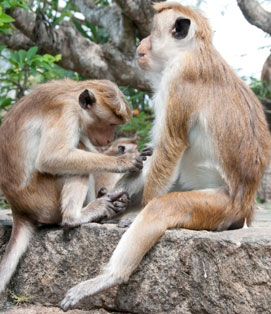Prenatal Cocaine Exposure Increases Monkeys' Impulsivity Into Adulthood
Dr. Michael Nader and colleagues at Wake Forest University School of Medicine are conducting an ongoing study of the effects of prenatal cocaine exposure throughout the lifetimes of a cohort of rhesus monkeys of both sexes. Recently, the team reported that at 14 years of age, 10 prenatally drug-exposed animals were much slower than 10 controls at stopping a formerly rewarding behavior that no longer paid off: pressing a lever that previously had delivered banana-flavored pellets but no longer did so. This result indicates that, in monkeys, cocaine exposure during gestation can impair the ability to adjust to changing circumstances well into adulthood.

In another trial, six prenatally cocaine-exposed male monkeys exhibited a greater preference for having rewards right away rather than after a delay, as compared with five control males. This time, the researchers gave the monkeys a choice between pressing one lever to receive a single banana-flavored pellet immediately or another lever to receive three pellets after a delay. On average, the cocaine-exposed males took the single pellet when the three pellets had not been forthcoming after 50 seconds, whereas the control animals waited about 150 seconds for the triple reward. In contrast, the cocaine-exposed female monkeys did not differ from those in a comparison group.
The two behaviors tested by the Wake Forest team are called behavioral extinction and delay discounting. Both are considered to measure impulsivity, a trait that in humans is associated with vulnerability to drug abuse and addiction. However, the team’s finding that prenatal cocaine exposure influenced behavioral extinction in both sexes, but delay discounting only in males, suggests that the two measures are not interchangeable.
Psychopharmacology 213(4):799–808, 2011. Full Text Available.


